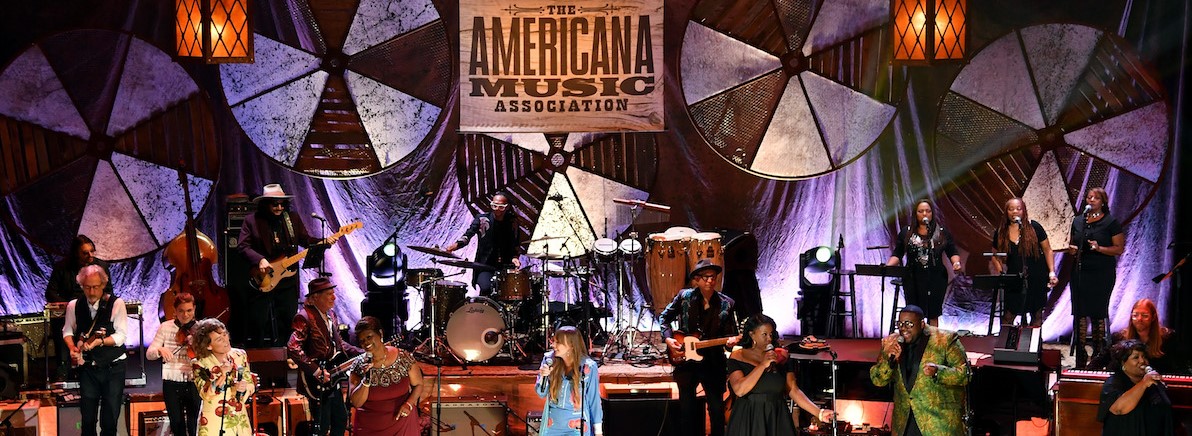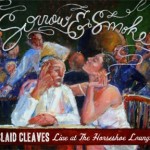 I first saw Slaid Cleaves on stage at the Barns of Wolf Trap outside Washington, D.C. He was the opening act, but he quickly won over a tough audience with his compelling story-songs and confident presence.
I first saw Slaid Cleaves on stage at the Barns of Wolf Trap outside Washington, D.C. He was the opening act, but he quickly won over a tough audience with his compelling story-songs and confident presence.
“Sorrow And Smoke: Live at the Horseshoe Lounge, a new two CD set (#26 on the Americana music chart), captures a similar performance at an Austin bar that he confesses he was once afraid to enter.
It’s as real as a live album gets, complete with banter, audience shout-outs, a false start and plugs for a local record store and Cleaves’ website.
It’s also pretty stark, with basic acoustic accompaniment, and serious themes. “Another day another year, death keeps whispering in my ear,” he sings on “A Sinner’s Prayer.”
When Cleaves does lighten up a bit, the performance is fun and boisterous, particularly on “Tumbleweed Stew.”
“Go for the Gold” is the set’s new song and it’s an intriguing one. Cleaves channels Woody Guthrie on this vintage-sounding, yet very contemporary gospel song that criticizes those who would use faith to divide us.
Slaid Cleaves is a talented songwriter who can win over an audience. “Sorrow and Smoke” makes that doubly clear.
Author: Ken Paulson
Glen Campbell’s powerful “Ghost on the Canvas”
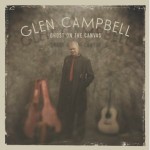 Tickets for Glen Campbell’s final show at the Ryman Auditorium in Nashville on Nov. 30 go on sale at 10 a.m. on Friday, Sept. 9. It’s part of the “Goodbye Tour,” Campbell’s farewell concert series in the wake of his Alzheimer’s diagnosis.
Tickets for Glen Campbell’s final show at the Ryman Auditorium in Nashville on Nov. 30 go on sale at 10 a.m. on Friday, Sept. 9. It’s part of the “Goodbye Tour,” Campbell’s farewell concert series in the wake of his Alzheimer’s diagnosis.
I respect Campbell and his family, and their decision to face his illness in a public and forthright way. They give the audience a clear understanding of the challenges Campbell faces, and provide context for his new and deeply personal music.
Campbell’s new album “Ghost on the Canvas,” billed as his final release, reflects his condition. The opening song “A Better Place” spells that out: “Some days I’m so confused Lord, my past gets in my way, I need the ones I love, Lord, more and more each day.”
It is a powerful and emotional album, and the last musical testament of a major figure in pop and country music. The songs document both his struggles and hopes, and even songs by Paul Westerberg and Jakob Dylan seem tailored for Campbell.
As fine as this album is, reflections on mortality are not everyone’s first download choice.
If you don’t know Campbell’s work, you might consider a collection of his early hits. In tandem with Jimmy Webb, Campbell created several pop masterpieces, including “By the Time I Get to Phoenix” and “Wichita Lineman,” that rank with anything of their era.
Buddy Holly at 75
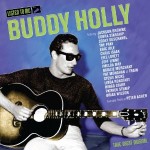 This day in Americana music: Buddy Holly would have been 75 years old today, and it’s a measure of his impact that there are two new star-filled tribute CDs celebrating his work. “Rave On Buddy Holly,” currently number 23 on the Americana Music Association chart, veers younger with bands like the Black Keys and Florence and the Machine, though Paul McCartney and Nick Lowe contribute as well. As with all tributes, “Rave On” is uneven, with a number of artists losing the spirit of the original as they strive for something transformative.
This day in Americana music: Buddy Holly would have been 75 years old today, and it’s a measure of his impact that there are two new star-filled tribute CDs celebrating his work. “Rave On Buddy Holly,” currently number 23 on the Americana Music Association chart, veers younger with bands like the Black Keys and Florence and the Machine, though Paul McCartney and Nick Lowe contribute as well. As with all tributes, “Rave On” is uneven, with a number of artists losing the spirit of the original as they strive for something transformative.
The new “Listen to Me” is more old-school, with Peter Asher (of Peter and Gordon, who recorded “True Love Ways”) producing and a more senior line-up, including Brian Wilson, Jackson Browne and Ringo Starr, who sounds like he’s having a particularly good time. There’s something to be said for picking performers who thrilled to 100-proof Holly when he was alive and changing the face of American music.
Paul Kelly’s “Greatest Hits”
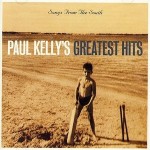 Talk about your continental divide. I knew Paul Kelly’s name because some of my favorite artists, including Last Train Home, Kelly Willis and Kasey Chambers had recorded his work.
Talk about your continental divide. I knew Paul Kelly’s name because some of my favorite artists, including Last Train Home, Kelly Willis and Kasey Chambers had recorded his work.
But I’ll have to admit that I was totally unprepared for the scope and quality of the music on “Songs of the South: Paul Kelly’s Greatest Hits,” a 40-song reissue about to be released.
Kelly is in fact one of Australia’s most respected singer-songwriters. The “greatest hits” collection spans about 25 years of his work, serving as both a career overview and an introduction to an artist too few Americans know about.
The range is remarkable, a bit like if you had never heard Elvis Costello and were suddenly introduced to his endless permutations.
Early Paul Kelly sounds a bit like early Al Stewart and current John Wesley Harding, but it all evolves into intriguing rock, pop, country and folk.
There’s a bit lost in translation, most notably the tribute to cricket legend “Bradman,” but it’s a compelling collection overall.
From the charming “St. Kilda to King’s Cross” to the haunting “Deeper Water” and the heart-rending “How to Make Gravy,” this album makes clear just what this continent has been missing.
Review: Robert Earl Keen’s “Ready for Confetti”
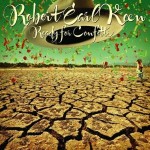 Robert Earl Keen’s 16th album “Ready for Confetti” is a musically adventurous, almost joyous-sounding album that lives up to its playful title.
Robert Earl Keen’s 16th album “Ready for Confetti” is a musically adventurous, almost joyous-sounding album that lives up to its playful title.
Keen has said he approached this album differently, writing on the road for a change and encouraging lots of feedback. It worked. “Ready for Confetti” is a diverse, yet focused collection, packed with memorable songs.
Fron the upbeat title song to the reggae-flavored “Waves on the Ocean,” Keen sounds like a man having fun making music and experimenting with new sounds.
On much of the album, he sounds hopeful and happy – except when he’s clearly not.
“The Road Goes on and On” is a double-barreled assault on Toby Keith. It wonders what Keith will do when his “sycophants” leave him and charges that “You lost your grip on that flag you wave, but you wave it right or wrong.” It’s tough stuff and very entertaining.
What inspired the song?
Keen told the Austin American-Statesman: “It’s been some stuff that has happened over the years, but the last thing was that single off his last record (“Bullets in the Gun”). I never pay any attention, but my phone exploded with e-mails and texts about the song; People were saying, how come he took your song and why didn’t he come up with his own song?
Melodically, it’s not dead on top of it, but cadence-wise and story-wise, it’s taken out of (Keen’s song) “The Road Goes On Forever.”
… I wasn’t about to sue him, so I thought I’d answer in kind. I just wanted to say, stop with the nonsense. So I wrote him a song. It’s no different than Kitty Wells or Hank Thompson singing “(It Wasn’t God Who Made) Honky-Tonk Angels” or classic literary characters like Alexander Pope or Jonathan Swift answering people. You answer them in the way you know how to best answer. There’s a precedent in literature and music for doing that, so that’s what I did.”
Keen revisits “Paint the Town Beige,” one of his best songs, with a new and simpler take. He also covers Todd Snider’s “Play A Train Song” and closes out the album with the century-old “Soul of a Man.”
“Ready for Confetti” is one of Keen’s most engaging albums, and that’s saying something. 16 albums in, the music’s as fresh as ever.
New this week: Brigitte DeMeyer’s “Rose of Jericho”
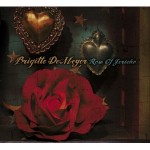 Out this week is Brigitte DeMeyer’s first album since moving to Nashville and “Rose of Jericho” shows that she’s fallen in with good company.
Out this week is Brigitte DeMeyer’s first album since moving to Nashville and “Rose of Jericho” shows that she’s fallen in with good company.
Brady Blade is back to produce the new album, with Nashville neighbors Will Kimbrough, Mike Farris, Sam Bush, Mike Henderson, Al Perkins, John Deaderick and others lending their talents.
The first two songs on DeMeyer’s fourth album illustrate the duality of the songs on “Rose of Jericho.” “One Wish” is a buoyant gospel song (“If I had one joy to sing/I’d tell the people about a mighty king”), but then the country-flavored “This Fix I’m In” brings it all back to the earthly concern of missing your child while on the road. Themes of Home and Heaven run throughout the album.
There’s some Maria Muldaur in DeMeyer’s vocals and style, most evident on “Alright A-Coming” and “Say Big Poppa.” And like Muldaur, DeMeyer has the confidence to tackle a variety of styles, and the voice to back it up.
Review: The 1861 Project
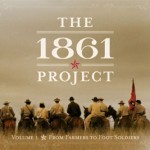 You can’t put “The 1861 Project” on shuffle.
You can’t put “The 1861 Project” on shuffle.
This ambitious, engaging and yes, educational project chronicles the Civil War through the perspectives of those who fought it.
The stirring John Anderson performance on “The Turning of a Field” foreshadows the events of the next four years, culiminating in the surrender at Appomattox and the soldiers’ return home.
There are inherent challenges in a project that tries to recapture the emotions and spirit of an era long gone. The music has to be contemporary (the hit songs of the 1860s don’t wear very well) and yet sound like they’re of a kind with the time. Producer Thomm Jutz and a talented group of writers, including Peter Cronin, Charley Stefl, Jon Weisberger, Stan Webb, Irene Kelley and
Dana Cooper accomplish that nicely.
The second challenge is to tell the story of the Civil War in some detail, yet not let it overwhelm the music. Case in point, these lyrics from Jutz and Cooper’s “Greater Gentlemen”: “Grant let them keep their horses/he ordered there’ll be no cheers/ these soldiers are our countrymen, though we’ve fought them for four long years.”
That’s a mouthful, but somehow it works.
A highlight of “The 1861 Project” is Marty Stuart’s performance on “The Soldier’s Dream,’ but there are fine players throughout the album.
Granted, there’s a certain threshold to enjoying this album. If you don’t care at all about the Civil War, this is a tough sell. But for buffs, Americana music fans looking for something a little different and teachers everywhere,”The 1861 Project” offers an appealing mix of history and artistry.
Jeff Bridges: High profile and low-key music
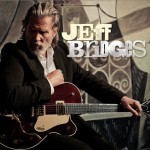 You don’t hire T Bone Burnett to produce a vanity project.
You don’t hire T Bone Burnett to produce a vanity project.
Jeff Bridges won an Oscar for playing a ragged country singer in “Crazy Heart”, but his aspiration to do it for real is more than fantasy. His new album
is credible, distinguished by talented players and songs from fine Americana music writers. It’s also uneven and not particularly interesting.
The album starts strong with “What A Little Bit of Love Can Do,” a jangly tune written by the late Stephen Bruton. If Buddy Holly had lived to 2011, this would have been his new single, “It’s So Easy” revisited.
From there the album shifts into a different gear, dominated by slow and even draggy songs (the interminable “Slow Boat.”)
The best tracks are John Goodwin’s contributions “Maybe I Missed the Point” and the Guy Clark-flavored “The Quest,” along with Greg Brown’s “Blue Car.”
There’s a lot of talent here, including guest vocals by Rosanne Cash, Ryan Bingham and Sam Phillips, but “Jeff Bridges” the album just isn’t in the same league as Jeff Bridges the actor.
Americana music by the book
![links_ama[1]](http://sun209.com/wp-content/uploads/2011/05/links_ama1.jpg) I’ve never seen Americana Music Association Executive Director Jed Hilly so excited about a reference book. From the Americana Music Assocation website:
I’ve never seen Americana Music Association Executive Director Jed Hilly so excited about a reference book. From the Americana Music Assocation website:
“Merriam-Webster announced today, as reported by the Associated Press, the inclusion of the musical definition of the word Americana to its Collegiate Dictionary. Americana joins Tweet, m-commerce and around 100 other words whose use is now widely recognized enough to be a part of today’s lexicon. According to the dictionary’s editors Americana music is defined as:
a genre of American music having roots in early folk and country music
Americana, as a musical term, has been under consideration longer than the 12 years the Americana Music Association has been in existence. Merriam-Webster’s inclusion of the word is based on widespread general written use, longevity, and an easily discernible definition.
“I’m thrilled. It’s affirmation of what we have been saying for over a decade” said Jed Hilly, Executive Director of the Americana Music Association. “To have an authority like Merriam Webster do the research and determine that our society recognizes the Americana genre is really great.”It’s about time. Next step: The thesaurus.
Nick Lowe at Country Music Hall of Fame

Nick Lowe at the Country Music Hall of Fame Copyright 2011
In an interview with Michael McCall at the Country Music Hall of Fame this morning, Lowe said his goal as a performer is to be cool enough to attract both young and old.
“You get different generations coming to see you, none of whom are under duress,” Lowe said, noting that the older attendees at Justin Bieber shows aren’t there voluntarily.
Lowe said he’s pleased when people cover his songs (“Nice work if you can get it”), but is disappointed when artists play his songs too faithfully.
He said he was told that George Gershwin hated it when others recast his songs. “He wasn’t really a rock ‘n’ roll guy,” Lowe said.
“I like it when people take liberties,” he told the audience.
Lowe also reminisced about his relationship with Johnny Cash, his father-in-law while married to Carlene Carter. He said he spent an entire drunken eveing writing a song to pitch to Cash.
“At about 4 that morning, I thought I was the great man,” he said.
Carlene was inspired enough by the song to call Johnny to come and hear the song the next morning. Cash did show up, with full entourage in tow.
Lowe recalls that he performed “The Beast in Me” with an awful hangover and a performance to match.
At the end of the song, there was silence. Johnny Cash then said “Play it again.”
“It was even worse the second time,” Lowe recalls.
But something in the song resonated with Cash, who later recorded it to critical acclaim.
Now Lowe performs the song with Cash in mind.
I do it like him,” Lowe said. “I don’t do it like me anymore.”
At the close of his interview, Lowe performed a seven-song set:
1. Stoplight Roses (from the forthcoming “The Old Magic”)
2.Ragin’ Eyes
3.Sensitive Man (also from “The Old Magic”
4.Raining, Raining
5.When I Write the Book
6.What’s So Funny About Peace, Love and Understanding?
7. The Beast in Me
John Hiatt’s “Dirty Jeans and Mudslide Hymns”
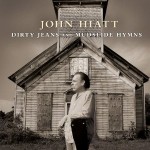 John Hiatt’s 20th album “Dirty Jeans and Mudslide Hymns” continues his remarkable streak of consistently solid recordings. It feels like an extension of last year’s “The Open Road,” with a few more songs about regrets and a couple of compelling compositions about transportation.
John Hiatt’s 20th album “Dirty Jeans and Mudslide Hymns” continues his remarkable streak of consistently solid recordings. It feels like an extension of last year’s “The Open Road,” with a few more songs about regrets and a couple of compelling compositions about transportation.
The album opens with “Damn This Town,” a vow to leave everything and everyone behind. The arrangement echoes “Perfectly Good Guitar,” but it comes from a much darker place.
“All The Way Under” and “Down Around My Place” are both evocative songs, riddled with despair.
The man who wrote “Drive South” celebrates a classic car on “Detroit Made,” a rocking ode to a Buick Electra 225. There’s also a fine train song here, “Train to Birmingham.”
The often somber feel of the album makes “I Love That Girl,” the one unabashed pop song, a joyous change of pace.
“Dirty Jeans” closes with “When New York Had Her Heart Broke,” a song about the events of 9/11, written and first performed days after the attacks. You can understand why it’s been on the shelf, but a decade later, it’s powerful and touching.
Dave Alvin: Eleven Eleven
 What’s the deal with Johnny Ace?
What’s the deal with Johnny Ace?
A modest figure in R&B history (“Pledging My Love”), Ace achieved some level of pop immortality due to his untimely death in a gun accident on Christmas Day 1954. Nonetheless, he’s inspired two outstanding songs about his demise: Paul Simon’s “The Late Great Johnny Ace” and now Dave Alvin’s “Johnny Ace is Dead.”
Alvin’s song is as much journalism as songwriting, detailing Big Mama Thornton’s reaction to the shooting and post-death efforts to exploit Ace’s career.
“Eleven Eleven”, Alvin’s new album is full of such gems.
Alvin channels a proud former union member on “Gary, Indiana 1959,” sings the distinctly unsubtle seduction song ‘Dirty Nightgown” and duets with the late Chris Gaffney on the buddy song “Two Lucky Bums.”
It’s a diverse album, packed with compelling narratives and a driving spirit.
Jonell Mosser: Great Fortune
 Jonell Mosser is one of Nashville’s best vocalists and most vibrant performers – and maybe the most under-recognized.
Jonell Mosser is one of Nashville’s best vocalists and most vibrant performers – and maybe the most under-recognized.
She’s well-known and loved in Nashville, but has never caught the national break she deserved.
When Ringo Starr, Don Was and Benmont Tench formed a new band in the ’90s called the New Maroons, Jonell was their choice for lead singer. When that band foundered after a Farm Aid show, Jonell’s big break was gone.
Yet she has persevered, delivering soul and rock with passion and purpose. Her live dates are electric, and her albums – particularly “Enough Rope, “Trust Yourself” and the sadly unreleased “Time Will Do the Talkin'” – are thoroughly engaging and powerful.
The new “Fortunes Lost, Fortunes Told” ranks with her best work.
Backed by a terrific band that includes Kevin McKendree, Tom Britt and Craig Krampf, the new album is full of love songs for adults, with all that implies.
“Nicer to Me” is a standout, a gently rocking, confident song that asks for a little more respect: “I know sometimes it’s tough baby, but you could be a litle bit nicer to me.”
“Ordinary Splendor,” is a ballad with a classic sound, written with John and Johnna Hall. It first appeared on her “So Like Joy” and is well worth revisiting.
While most of the tracks were written by Jonell and Tom Britt,the handful of covers are impeccable.
The album’s “single” is “I Can Give You Everything, a hard-charging, riff-laden song written by Al Anderson and Terry Anderson. Mosser has covered Al Anderson before; her “Bang Bang Bang” was wall-rattling rock ‘n’ roll.
Jonell clearly has an affinity for Nick Lowe. Her take on “When I Write the Book” was a highlight of her “Enough Rope” album (and her live show) and here she does a compelling cover of his “Rome Wasn’t Built in a Day.”
Nashville has the good fortune to have Jonell Mosser as an artist in residence, but her talent – and “Fortunes Lost, Fortunes Told” – deserve a much wider audience.
New Chet Atkins exhibit open
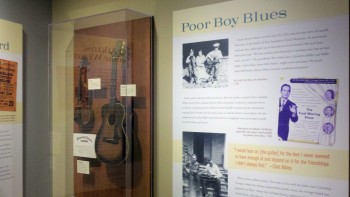
The new Chet Atkins exhibit at the Country Music Hall of Fame will is now open. It’s a treat for fans of his music, as well as guitar buffs.
The heart of the exhibit is the battered Sears Silvertone guitar Atkins learned to play on. From there, the guitars and career get considerably more impressive.
The exhibit occupies the space previously devoted to Tammy Wynette. Her dream closet has been supplanted by the recreation of Atkins’ home workshop, where he tinkered on guitars and tried to come up with new sounds.
While Chet Atkins is widely associated with modernizing the sound of country music as a producer, portions of the exhibit remind us of his roots and his partnership with the Carter Family. This was the Americana music of the ’40s.
Ten years after his death, Chet Atkins remains one of the most respected figures in Nashville music history. This exhibit is a compelling reminder of his legacy.
Review: Nick 13
 You don’t often see the words “psychobilly” and “Lloyd Green” in the same sentence, let alone on the same album. Yet that’s truly the charm of “Nick 13,” the solo debut by the artist of the same name.
You don’t often see the words “psychobilly” and “Lloyd Green” in the same sentence, let alone on the same album. Yet that’s truly the charm of “Nick 13,” the solo debut by the artist of the same name.
Nick 13 is best known as singer and songwriter for Tiger Army, a psychobilly band that draws on the genre’s punk and rockabilly influences. The surprise is that he dials everything down for this album, embracing a vintage country sound and recruiting some vintage country sidemen, including Green on pedal steel.
It’s an up-tempo and engaging album, drawing on countrypolitan and classic country. Nick 13’s voice bears a striking resemblance to Phil Ochs and serves him well on these straight-ahead arangements.
The album opens with “Nashville Winter,” a presumably autobiographical song about coming to the pace of country’s roots: Ariund this world I have rocked and I have rolled, but something much older had a hold on my soul.”
That respect for the music’s origins is evident throughout the album: “Carry My Body Down” and “Gambler’s Life” are Country and Western with the emphasis on the latter, and his updated “In the Orchard” takes a cue from Roy Orbison.
“Nick 13”, co-produced by Greg Leisz and James Intveld, and featuring fine players like Mike Webb and Sara Watkins, successfully updates classic sounds in a contemporary setting. Nick 13’s solo career is off to a good start.
Bob Dylan, Leon Russell at the Ryman
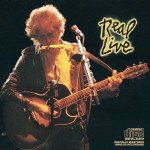 A legendary music figure took the stage at the Ryman Auditorium in Nashville tonight, performing his greatest songs in faithful, spirited versions. That was Leon Russell.
A legendary music figure took the stage at the Ryman Auditorium in Nashville tonight, performing his greatest songs in faithful, spirited versions. That was Leon Russell.
Of course, Bob Dylan took a different path.
Born just one year apart, Russell, 69, and Dylan, 70, were a study in contrasts.
Russell was determined to please. The newly-elected member of the Rock and Roll Hall of Fame did his hits and familiar covers, all at a brisk pace.
He opened with “Delta Lady,” the Rita Coolidge-inspired song that found its greatest success in the hands of Joe Cocker. He followed that up with the single from his first ‘Hank Wilson’s Back” LP,
“Rolling In My Sweet Baby’s Arms.”
He appeared frail, but you wouldn’t know it from the music. He covered the Beatles (“I’ve Just Seen A Face”) and the Rolling Stones. Despite the imagery, “Wild Horses” really shouldn’t be performed at a gallop.
Oddly, Russell began “Jumpin’ Jack Flash,” the song that electrified audiences at the concert for Bangla Desh (and moviegoers thereafter,) but cut it short to repeat the refrain from “Papa Was A Rolling Stone” over and over again.
“A Song For You” was the absolute highlight, with Russell performing solo on piano.
And then there was Dylan. By now, we know what we’ll get: A terrific band, limited vocal range and dramatic re-intepretations of some of his greatest compositins.
For Dylan fans, that’s plenty.
More casual fans are left wondering whether Dylan is actually capable of performing his songs as they were originally recorded. It’s a lively set, but certainly doesn’t pander. I began with “Leopard-Skin Pill-Box Hat” and “It’s All Over Now, Baby Blue,” before moving on to songs of more recent vintage, including “Things Have Changed” and “Thunder on the Mountain.”
I’ve always loved “All Along the Watchtower” by both Dylan and Jimi Hendrix and that song along would be worth the price of admission. Dylan’s re-working was so dramatic that I didn’t recognize it until I actually heard him sing the words in the title. Is that a daring re-invention or the waste of an extraordinary composition?
Nell Robinson – On the Brooklyn Road
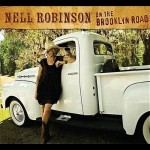 You have to love Nell Robinson’s story. From a booklet accompanying her new CD “On the Brooklyn Road: “So I just turned 50 and one of my good friends characterized my new-found devotion to music as a midlife crisis. I sang by myself in my car for 30 years and ventured out to sing in public at age 45. All I can say is, if you have music in your soul, bring it out. It has changed my life.”
You have to love Nell Robinson’s story. From a booklet accompanying her new CD “On the Brooklyn Road: “So I just turned 50 and one of my good friends characterized my new-found devotion to music as a midlife crisis. I sang by myself in my car for 30 years and ventured out to sing in public at age 45. All I can say is, if you have music in your soul, bring it out. It has changed my life.”
OK, I’ll admit that’s not encouraging. Midlife crises can spur inappropriate relationships, red sports cars and bad poetry. But in this case, it inspires a warm and engaging folk/bluegrass album.
It’s a mix of originals and well-selected covers like Loretta Lynn’s “I’m a Honky Tonk Girl” and “Turn Your Radio On.”
The latter figures prominently in a piece Nell Robinson wrote about her appearance on Praire Home Companion and the loss of her father. It’s very touching.
The album includes two bonus songs recorded by the Henriettas, a duo consisting of Nell and Cary Sheldon that channels the DeZurik Sisters, a 1930s duo also known as the Cackle Sisters. Very entertaining.
James Burton at Hall of Fame
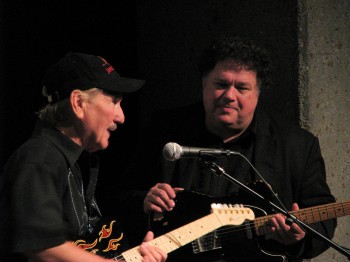
James Burton and Bill Lloyd
James Burton, the legendary guitarist who wrote the lick for Dale Hawkins’ “Suzy Q,” played lead guitar for Ricky Nelson throughout his television years and played in Elvis Presley’s band from 1969 on, was saluted at the Country Music Hall of Fame in Nashville today. Part of the Nashville Cats series hosted by Bill Lloyd of Foster and Lloyd, the program spanned more than five decades of music.
Burton recalled how he was invited to live with Ozzie, Harriet and the family for two years while we was working on the show. He became such an integral part of Rick Nelson’s sound that he was told not to play with others.
Burton made up for lost time in the early ’60s, becoming one of the nation’s most sought-after session players. The Mamas and Papas, Byrds and Monkees all had help from Burton.
Over the years, Burton played in Emmylou Harris’ Hot Band, toured and recorded with John Denver and played with Jerry Lee Lewis and Elvis Costello, among many others.
Lloyd asked whether there was a “West Coast Country” sound. Did California session players take a more aggressive approach or was it just something about the way country albums were being recorded there?
Burton was emphatic: “No, it was for real. We were serious.”
Allman, Plant and Jayhawks set for Americana Music Festival
The Jayhawks, Gregg Allman, Robert Plant and the Band of Joy, Foster and Lloyd. Justin Townes Earle, North Mississippi Allstars and The Civil Wars are among the first artists announced for the 12th Annual Americana Music Festival and Conference, scheduled for Oct. 12-15, 2011 in Nashville.
It’s always an extraordinary festival, and the Americana Awards show is always a highlight.
Discounted early bird tickets are available through July.
Rock and Roll Joe
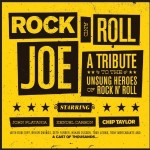 There are songwriters with more melodic voices and some with more chart success, but few are as consistently interesting as Chip Taylor. Best known as the writer of “Wild Thing” and “Angel of the Morning,” and more recently as an Americana artist, Taylor is never complacent. His 7 Days in May told of his complicated romance with a young French woman, the topical Black and Blue America channeled U.S. history and Yonkers, NY revisited his childhood. This is not a man who just strings songs together.
There are songwriters with more melodic voices and some with more chart success, but few are as consistently interesting as Chip Taylor. Best known as the writer of “Wild Thing” and “Angel of the Morning,” and more recently as an Americana artist, Taylor is never complacent. His 7 Days in May told of his complicated romance with a young French woman, the topical Black and Blue America channeled U.S. history and Yonkers, NY revisited his childhood. This is not a man who just strings songs together.
It’s little wonder, then, that his new album Rock And Roll Joe is similarly ambitious, recognizing the unsung heroes of rock music. Joined by Kendel Carson and long-time guitarist John Plantania, Taylor salutes Savoy Records players on “The Savoy Files,” revisits his own Hollies hit “I Can’t Let Go,” teases Plantania for leaving him to play with Van Morrison on “The Van Song” and celebrates the musician’s union on “The Union Song.” Whew.
Like all of Chip Taylor’s work, there’s a rough-hewn and almost off-the-cuff feel here. That intimacy – and Taylor’s sincerity – give Rock and Roll Joe its charm.
(Be sure to check out the companion website. It’s a terrific collection of essays about the largely uncelebrated musicians, writers and producers who transformed rock.)
